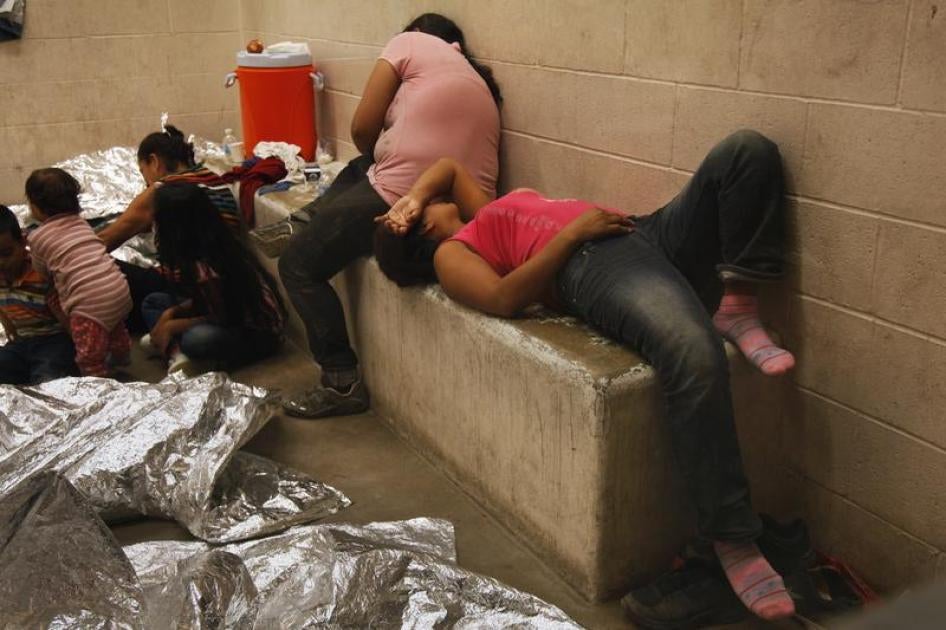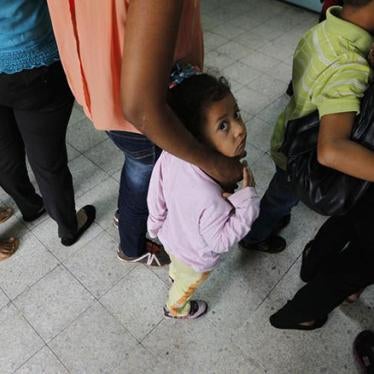(San Francisco) – A United States federal court ruling against the Obama administration’s detention of migrant families ruling is a significant step toward protecting the rights of children, Human Rights Watch said today. Under the decision, announced on July 24, 2015, the government may not hold children with their parents in prison-like facilities, and mothers who do not present a flight or security risk should be released with their children.
“The federal court very clearly found that locking up families harms children,” said Clara Long, US immigration researcher at Human Rights Watch. “The US should move swiftly to end its deplorable practice of detaining migrant families.”
Federal District Court Judge Dolly Gee in Los Angeles ruled that an 18-year-old settlement between the US government and child migrants still applies to children now detained with their parents. In April, Judge Gee had issued a tentative ruling saying the 1997 settlement in Flores v. Meese applied to children in family detention, and directed the government and lawyers for the migrant children to negotiate an agreement in compliance with it. No such agreement was reached. In her decision last week, Gee gave the government until August 3 to present a plan to carry out the ruling.
In mid-2014, the Obama administration, saying it wanted to deter undocumented Central American migrants from reaching the US border with Mexico, dramatically expanded family detention capacity, from less than 100 to more than 3,000 beds, including by building a new 2,400-bed facility in Dilley, Texas run by a private prison company, the Corrections Corporation of America.
International law strictly limits detaining children for immigration reasons and prohibits detaining asylum seekers except as a measure of last resort or to address individualized concerns about the potential for the person to cause harm to themselves or others. Human Rights Watch has documented how detention in these facilities takes a severe psychological toll on children and their parents.
In June 2015, the secretary of the Department of Homeland Security, Jeh Johnson, announced that the administration would make “substantial changes” to family immigration detention, including by limiting the detention of families who show they have reasonable or credible claims of fear of returning to their home countries, a first step in qualifying for asylum in the US.
The court’s decision affirms a preference for releasing children to a parent over another relative or community sponsor, Human Rights Watch said. Government lawyers have previously threatened to comply with a court order by releasing children while continuing to detain their mothers.
The government should reject steps that would continue the detention of migrant children or result in unnecessary family separations, which would harm the children, Human Rights Watch said. Children and parents who are released should be connected with community-based programs to help them comply with immigration court proceedings. The US should further make legal assistance available to families facing deportation.
“This court ruling is a chance for the US government to put a definitive end to its harmful and illegal family detention policy,” Long said. “The government should also recognize that separating a child from their parent is very rarely in the child’s best interest, and take that mean-spirited proposal off the table.”
|
News Release
US: Release Detained Migrant Children, Mothers
Federal Court Rejects Administration’s Family Detention Policy
Your tax deductible gift can help stop human rights violations and save lives around the world.
Region / Country
Most Viewed
-
June 3, 2025
“They’re Ruining People’s Lives”

-
January 25, 2024
“We’re Dying Here”

-
April 27, 2021
A Threshold Crossed

-
November 25, 2019
A Dirty Investment

-
November 19, 2012
Losing Humanity



